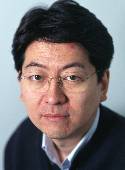Blowing Out the Walls ...with a Big Bang
Back to Contents of Issue: January 2000
|
by Yoko Shibata and Hugh Ashton |
|||||||
Online trading 1
Managing
director of Softbank Finance Corporation and head of E*Trade
Japan Yoshitaka Kitao told J@pan Inc. contributing
editor Yoko Shibata that E*Trade can easily secure 50% market
share. With
over 40 companies moving to offer online trading services,
do you still think E*Trade Japan can grab the lion's share? Do
you foresee any restructuring in the industry? It's
been rumored that E*Trade is planning a capital increase from
the current ¥1.5 billion to ¥3 billion. Why? What
investment products is E*Trade offering online? How
is your system development going?
On October 1, 1999, Japan introduced deregulation of trading commissions, meaning brokers were free to set their own prices. A vicious throat-cutting war started, with a positive flood of brokers coming online. Of these 36 (as of early November 1999), some were old hands in Japan, but novices to the online game, and some were entirely new faces. Prices have been dropping dramatically, with flat fees of between ¥2,000 ($19.42) and ¥1,000 ($9.71) being quite common, and some players (e.g., E*Trade Japan) even offering free-of-charge services for a trial to attract and retain customers. As a result of the commission war, the number of online investors has increased dramatically, in only one month, and at the same time, the number of e-brokerages has ballooned, with 40 currently competing and another 20 waiting in the wings. Nomura Securities, the market leader in this field, as in so many financial activities in Japan, recorded an increase from 60,000 to 80,000 online investors in this period (see chart). Other players, such as Nippon Global, have recorded even bigger gains in percentage terms. If the figures are a reliable guide, commission pricing is the biggest single factor in attracting individual investors. This runs contrary to the conventional wisdom that Japanese consumers do not buy on price, but rather on quality, but in an age when the fastest-growing sector of the retail industry is in the ultra-discount "100 Yen" stores, maybe it's not too surprising. However, in a later, more mature phase of this market, it is predicted that quality will come to the fore and price alone will be less of a factor in influencing customer decisions. New faces, new styles
of selling Even so, this lack of size is perceived as a problem by some. Not that there's any doubt whatsoever regarding the financial stability and integrity of Monex, but Yoshitaka Kitao, EVP and CFO of Softbank, speaking at Comdex Japan '99, questioned Monex's ability to provide back-office support to its users. He pointed out that E*Trade Japan, in which Softbank holds a 58% stake, will be able to provide telephone and other more personal support, corresponding to the hand-holding traditionally provided to Japanese investors. The main age group for online subscribers is expected to be males in their 30s and 40s, as these are the traditional Internet users with the money, but of course there will be both computer virgins and investment virgins who will want to use the online services. To help with the computer virgins, DLJdirect SFG proposes to use some of the synergy afforded by Sumitomo facilities (SFG--Sumitomo Financial Group--is one of Japan's most well-known financial organizations). Large branches of Sumitomo Bank may be equipped with computers, and onsite staff can assist would-be day traders to guide their cursors over the screens. Also using the ubiquitous Sumitomo presence, DLJdirect SFG can offer class-based training nationwide to its customer base. Those new to investment
will be assisted by DLJdirect SFG's investment game, whereby investors are provided
with a sizable chunk of play money, which must be divided at least ten ways. At
the end of the game period, the most successful trader will win a prize of some
value (for example, a wireless-capable PDA), with the obvious aim being to have
successful virtual traders at some time stop playing with matchsticks and start
buying their chips with real money, preferably at DLJdirect SFG. Why the gold rush? Further, Japan is sometimes
characterized as a nation of savers rather than investors, and the caution which
is supposedly exercised by the holders of the purse strings (almost invariably
the women of the household) will have to be overcome for any online trading scheme
to be successful. While characterizing the Japanese financial customer as a cautious
saver may have some validity, a quick look around the urban landscape here will
quickly reveal long lines waiting for opening time outside the ubiquitous pachinko
parlors each morning, where patrons can fritter away endless hours playing on
the Japanese equivalent of Vegas's one-armed bandits. Also, consider the vast
amounts spent each year on lotteries, and the sums wagered on horse, motorcycle,
bicycle and powerboat racing. And that's just the legally tolerated tip of the
iceberg. Japan may, in fact, be a nation of compulsive gamblers under a conservative
veneer. Given a 24-hour Internet stock service, it's not hard to believe that
the Japanese could become a nation of manic day traders, making buy and sell calls
with the same fanaticism with which they have embraced tamagotchi virtual pets,
Italian cuisine, and portable telephones.
The last example is not a frivolous one. In Japan there is approximately one portable phone for every three people. Of these 51 million phones, two million are i-mode digital-capable phones operated by NTT's DoCoMo. They're not "telephones" per se, but rather are essentially a slimmed-down Web terminal with voice capability (and at current subscriber growth rates, another two million are likely to be in service by March 2000). There are millions more similar phones belonging to rival carriers, most of which are typically owned by younger people with money. DLJdirect SFG's representative director, Atsushi Kunishige, sees the portable wireless market (Internet phones and PDAs) as a great opportunity for trading and also sees the PHS (Personal Handyphone) system as ultimately being better for data communications. Other trading houses tend to dismiss this as a gimmick, feeling that the current back-office systems lack the reliability and responsiveness to provide trustworthy customer service given the potential volume generated by such easy access. Added to this derisive attitude is the traditional wish of Japanese service providers (in all fields) to lock their customers into a proprietary solution, making it hard to change providers. Even so, many admit the viability of wireless terminals as a quoting service, even if they are not used for trading. Nonetheless, Daiwa Securi-ties estimates that the implementation of a service that uses this technology effectively could produce savings equivalent to the cost of a branch with up to 20 employees. As competition increases, this kind of cost-cutting calculation may force the hands of other later, possibly reluctant, adopters of this kind of open-technology standard. Remembering Sony's wide range of interests, including wireless networks, it is tempting to speculate how all this could affect Monex trading. Right now, Matsumoto feels that portable telephones are unsuitable as trading tools, but who's to say what's around the corner as a replacement? There's gold in them
thar hills Is all this effort worth it? Probably somewhere in the region of 3 million online investors are needed to keep the ship afloat. Literally trillions of yen from personal investors will be surging through the markets in the next twelve months (the exact number of trillions depends on who you talk to). With the reduced commissions, as well as the ease of trading by nontraditional means, it is likely that these personal funds will be turned over more rapidly than in the past. Even with the increased number of brokers, and factoring in lower commissions, at least some of the new online traders stand to recoup their setup costs, and at least some stand to make money. Now add the money that will come from the postal savings accounts and the situation is starting to look like a veritable vein of gold, waiting to be tapped. Why would these investors go online, though? Monex's Matsumoto feels he has at least part of the answer. Japan's birthrate is declining dramatically (he claims between 20% and 30% over the past 25 years), leading to a drop in the workforce. The government is frantically trying to figure out how to boost workforce numbers in order to maintain current levels of consumer spending-a very large part of Japan's GDP. Short of immigration (traditionally a nonstarter of a solution), the only recourse is to allow more nonworkers into the workplace. In Japan, this means women and older people. The result? There will be fewer people at home to stand in line at post offices and investment houses. The alternative is online financial services, including trading, and the market for such services may truly turn into a wealth-producing goldmine. But to get the gold, you must stake your claim. Kunishige feels that education is essential to stake out the territory, and DLJdirect SFG will provide a wide range of investor data to every visitor to its site (not just to its account holders) in an attempt to woo visitors and convert them to customers. There will also be training centers, including ones located near rail terminals, such as Tokyo Station. By contrast, Monex does not intend to hold its customers' hands, relying instead on its small size to be able to react quickly to market demand. Here, Matsumoto's personal experience as a trader shows through, focusing clearly on the needs of his clients, as well as the Sony corporate tradition of producing products that consumers want to buy. Yet another path is being taken by Softbank and E*Trade Japan, offering a wide range of complementary products and services (loans, banking, insurance) as well as the high brand value of E*Trade (TV advertisements have already started in Japan). Also, many traditional Japanese brokerages are taking the line that low commissions alone may be enough to drive sales. Since, they argue, the majority of their customers will be Internet-illiterate, price will be the driving factor, and bells and whistles can be ignored. The major players in the traditional fields, such as Nomura, who currently derive a relatively small (30% or so) of their profit from commissions, can still increase their profits if commissions drop by offering value-added services-such as their well-regarded research products-to a larger audience than they have at present. Who's right? Maybe all, maybe one, maybe none. Maybe the recipe for success in the Japanese online trading market has yet to be defined. Time will tell. Baiting the mousetrap The competition for fees from millions of frenetically trading-online Japanese will be terrific. Right now, all the major domestic players are entering the fray. Those without the in-house expertise or resources to set up an online trading system are outsourcing the work to set up the back office, and some odd marriages are being made. Nikko Securities, for example, is linking with Fujitsu to provide an online service known as Nikko Beans, to be offered to other players, as well as being provided via its own online venture with Fujitsu, Internet Trading Securities. Charles Schwab is seeking assistance from Nomura to help set up a Japanese-tailored service, and is also setting up operations with Tokyo Marine and Fire Insurance. Other, even less likely alliances are emerging. How about Dell, selling computers preconfigured for specific securities houses, and a securities house (Matsui) providing three hours' personal instruction to computer neophytes? Or DLJdirect SFG providing IBM PCs and dedicated trading terminals to its customers? Or computer retail chain Laox offering a trading package developed in con- junction with Daiwa Securities? If the U.S. model is a guide, it's almost certain that we will see a shakeout with the winner-or a small number of winners-taking all. But where the Internet is concerned, it often happens that U.S. models are not applicable to Japan, usually for subtle and trivial-sounding reasons, which elude analysts. One such reason might be caution. Japanese like to see themselves as "different." Whatever the truth of this, the fact remains that different financial habits do exist in Japan. One elderly married lady I knew kept money in some ten different bank accounts, the existence and contents of which were unknown to her husband until after her death. It's improbable that this could happen outside Asia. Another technological-based example of how the market might develop differently is the widespread use of mobile Internet terminals (disguised as cellular phones). Despite current skepticism, the sheer potential volume of trading on these devices, on a minute-by-minute basis if necessary (if the front end is made simple enough), could have a severe impact on the way that equity markets behave, and thereby on the brokerage houses themselves. One thing is certain, though-the
individual Japanese investor now has more choice of how and where his or her money
goes. Encouraging average Japanese investors to take responsibility for their
financial decisions will go a long way to ending the dependence on "authority"
in its various forms, which has held back Japanese society in so many areas. In
this sense, the coming of online investment to Japan is a Good Thing, not only
for the brokers but for Japanese society as a whole. |
|||||||
Note: The function "email this page" is currently not supported for this page.








